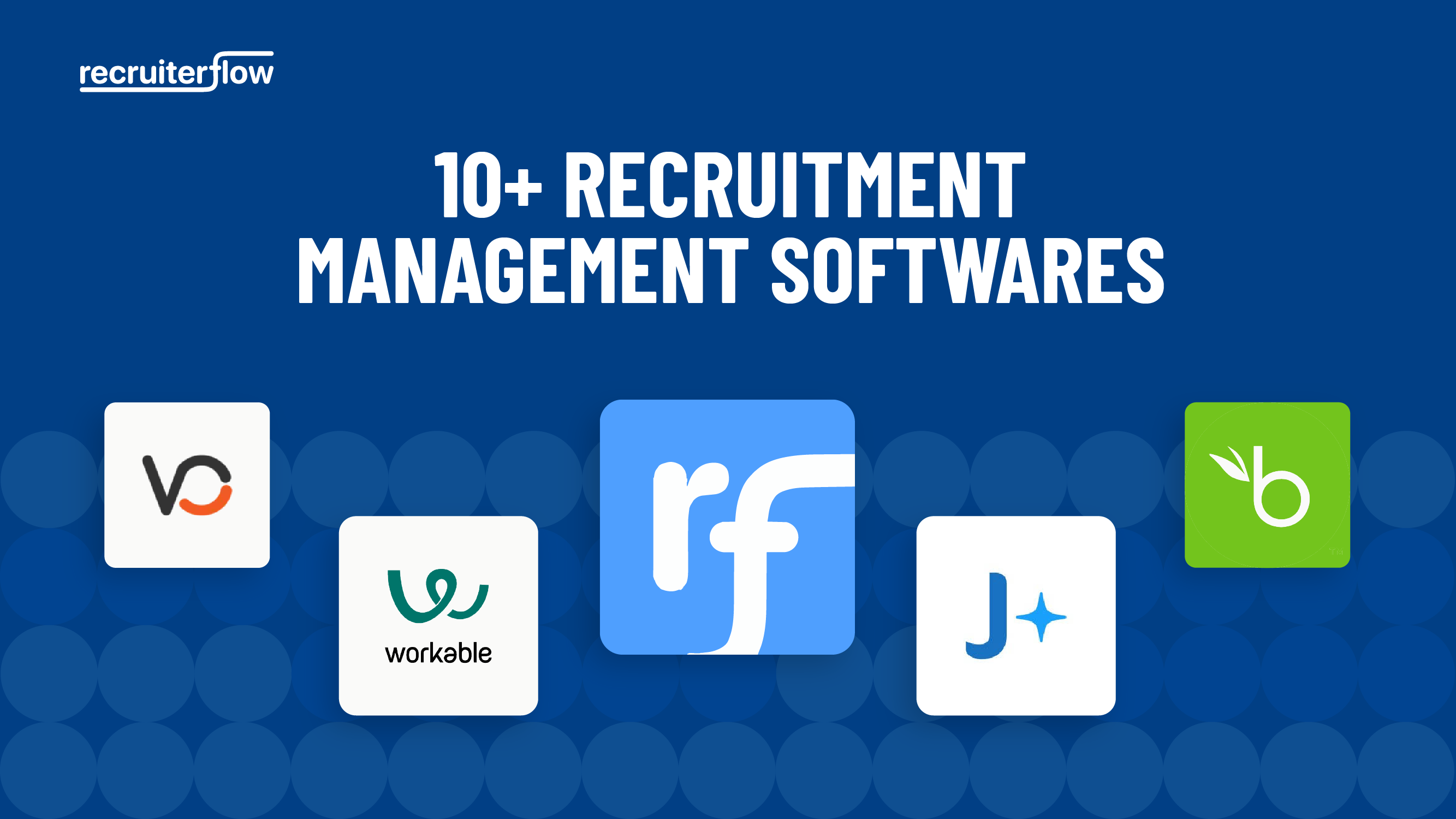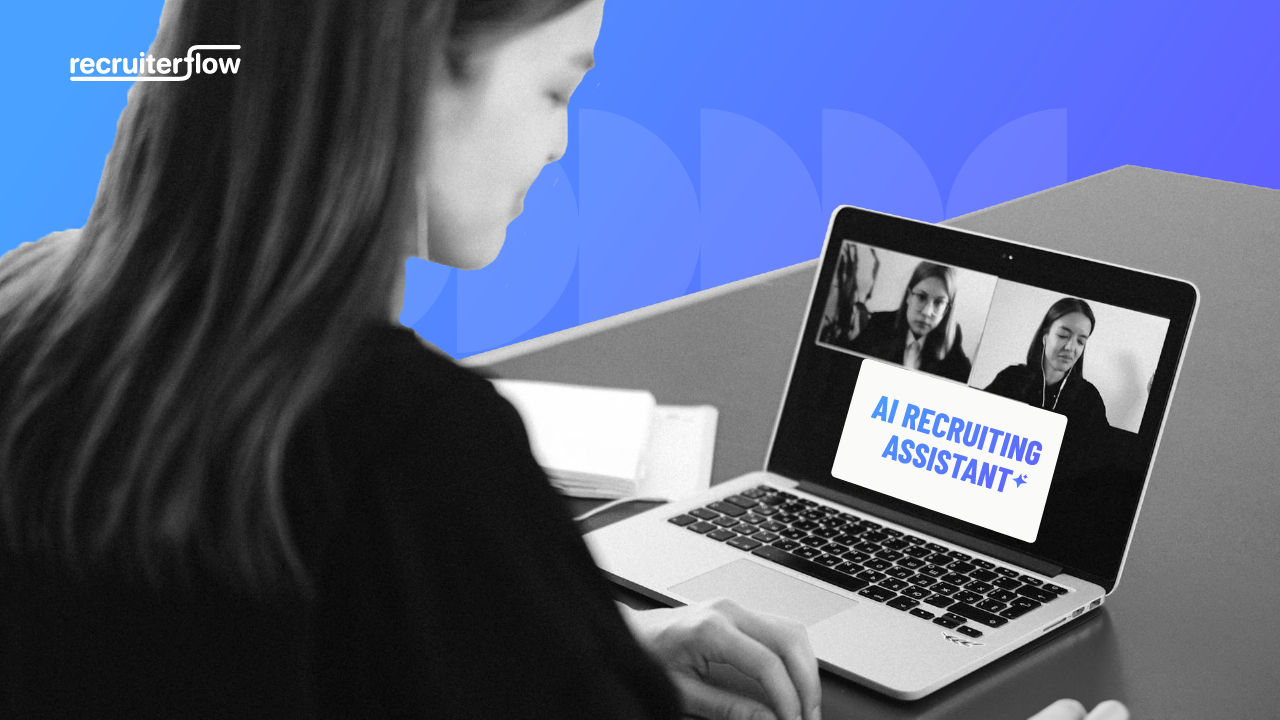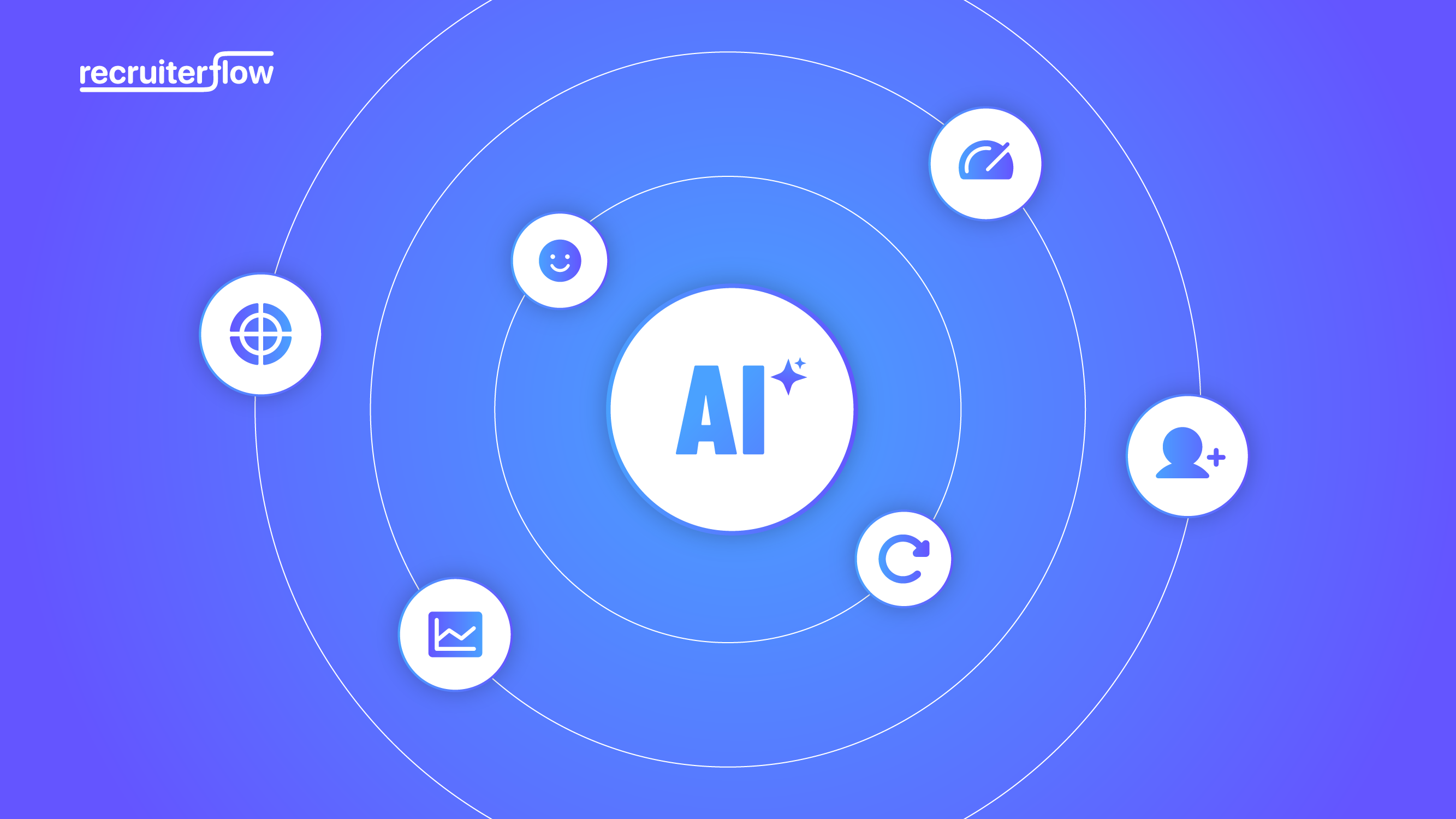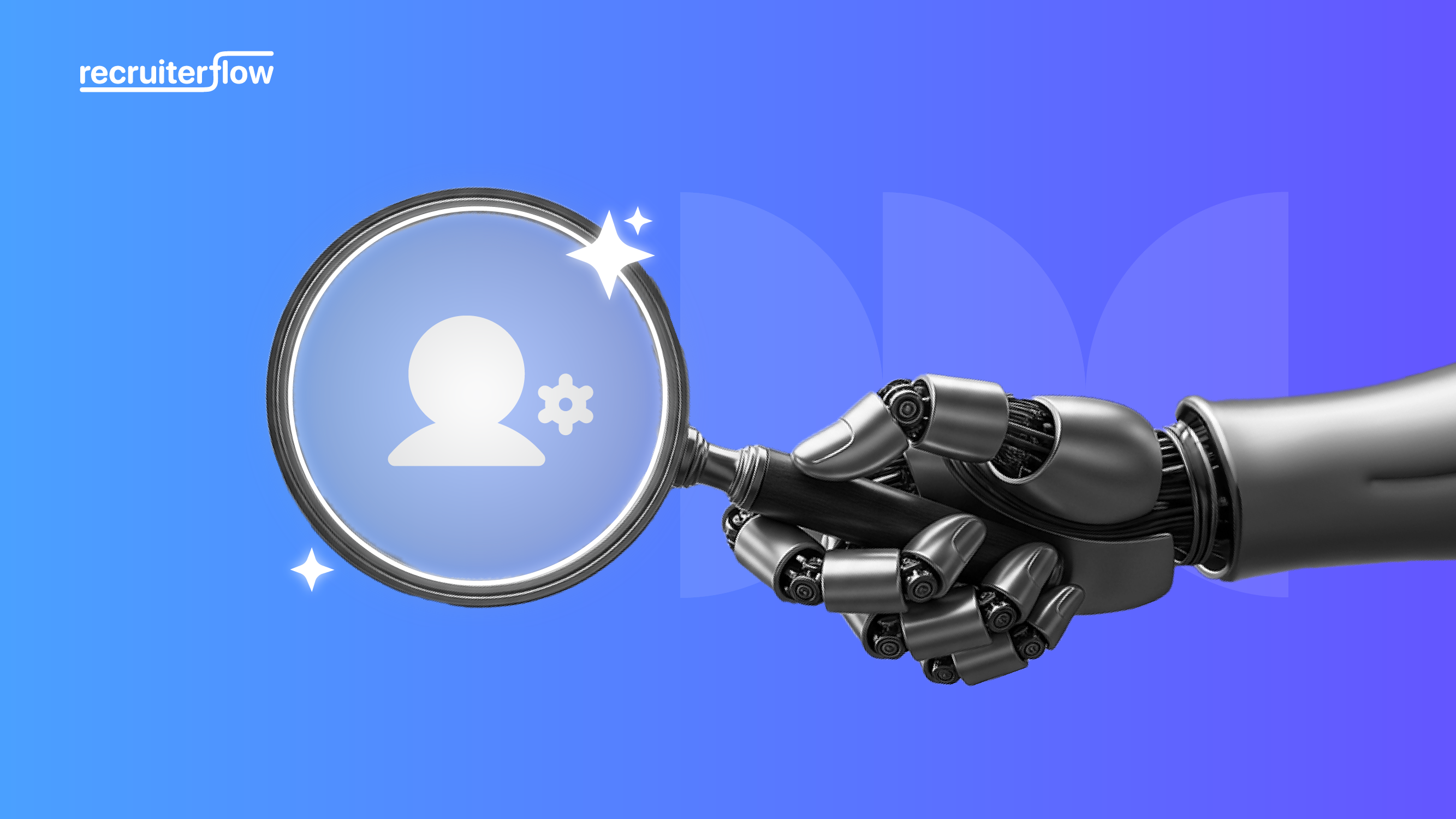
AI Recruiting Assistant: What is it & How to Use?

It’s not news that recruiters today spend a majority of their time on repetitive admin tasks. Here’s a scenario:
You are a recruiter. You get on a call with a candidate, greet them, ask a few questions while scribbling notes because subconsciously you know what’s next–updating the CRM.
By afternoon, you have the CRM to update, send that follow-up email, track a candidate’s new job, enter their notice period, and a bunch of other tasks that just take away your focus.
Recruiters routinely spend 20-30 hours a week (*up to 75% of their working hours) on manual tasks unrelated to closing deals.
But your day could be different. You can focus on building relationships and taking decisions. Imagine a scenario where your notes are taken, the CRM is updated automatically, follow-up tasks are generated, and emails are written.
This is just one of the many ways an AI Recruiting Assistant can change your life as a recruiter. The benefits of an AI recruiting assistant are endless and in this blog, we’ll help you understand that.
Here’s a brief overview of what this blog covers:
- What is an AI recruiting assistant?
- The benefits of AI recruiting assistants for recruiters.
- How it works alongside the recruiter
- What Makes the Best AI Hiring Assistant for Recruiting?
- How to implement one in your workflow
Most importantly, we’ll talk about how an AI assistant doesn’t replace recruiters but frees them up to do more.
What Is an AI Recruiting Assistant?
An AI recruiting assistant is like a digital twin. It is an intelligent, autonomous, always-on teammate who works 24×7 to take over admin tasks such as updating CRM data, summarising calls, and drafting follow-ups. Think of it as a recruiter’s AI twin that does all the grunt work while recruiters focus on conversations and decisions.
Surpassing chatbots or glorified notetakers, AI recruiting assistants are context-aware systems embedded inside a recruiter’s tech stack.
Also Read: The Future of AI in Recruiting.
What AI Assistants for Recruiting actually do
Your AI twin will do quite a lot through the workday:
- Transcribe calls, tag discussions, and extract information on skills, salary expectations, and availability.
- Update candidate profiles.
- Monitor job changes, company moves, and contract updates.
- Preps you for calls with conversation history and insights.
- Structure data to keep it clean and usable.
It takes over everything that doesn’t require human intelligence, leaving recruiters free to pursue relationship-building, persuasion, and judgment.
Bottomline: An AI Twin helps recruiters focus on conversations and decisions, not admin.
Benefits of an AI Assistant in Recruiting
61% of recruiters report burnout. It’s also why your best consultants are spending 40% of their time on tasks that don’t generate revenue. AI twins like AIRA change that.
Cuts Down Admin Time
The right AI Twin can reduce about 10-15 hours of admin work every week giving recruiters their time back.
Here’s a breakdown to explain exactly how:
- Updating CRM data: 2–3 hours/week
- Retrieving structured data: 3–4 hours/week
- Contextualized communication: 2–3 hours/week
- Smart reminders, opportunity monitoring, meeting prep: ~2 hours each/week
Reduces Burnout and Turnover
As mentioned earlier, recruiter burnout is a reality for 61% of recruiters due to repetitive administrative tasks. A recruiting AI assistant absorbs much of that load, freeing recruiters for meaningful talent development work like sourcing top candidates and nurturing skills.
Utilizes your Existing Database Better
Only 10% of recruiters regularly update data. AI assistants can revive underused data sources. Recruiterflow’s internal research has found that internal databases drive close to 60% of placements once clean and active.
When your data is out of sync with reality, you’re leaking revenue.
Increase Revenue per Recruiter
Hays, Robert Half, and Korn Ferry all show measurable productivity lifts when using the most effective AI assistants for recruiting:
- Korn Ferry: 50% increase in sourcing, 66% decline in time-to-interview.
- Hays: 41% increase in candidate engagement.
Smart AI investments are the ones that eliminate low-leverage tasks. These are the ones that lead directly to burnout and missed revenue. That way, each recruiter gets far more done to contribute to company revenue directly.
How do these AI Assistants work with Recruiters?
Let’s understand with a realistic example of AIRA, Recruiterflow’s AI recruiting assistant built exclusively for recruiters.
Here’s what a typical day in the life of a recruiter currently looks like:
Join a call > take meeting notes > update CRM > next call > update CRM.
On average, recruiters spend 15-20 mins after every call updating the CRM. Even if you do 8 calls everyday, that’s 2 hours spent every day in admin work.
It’s not about admin alone. When recruiters are focused on taking notes, they miss out on the subtle nuances of the conversation. The awkward pauses, the shift in tonality – the human aspects of the conversation get missed. Conversely, when recruiters are focused on the conversation alone, notes are missed.
Enter AIRA Notetaker on Recruiterflow.
Unlike a usual notetaker, AIRA notetaker is an active part of the conversation, not a passive spectator.
AIRA listens to calls, understands the context and after every conversation:
- Create customised call summary
- Updates CRM data
- Assigns tasks to individual or teams
This ensures recruiters can entirely focus on the conversation and make an informed decision while AIRA takes care of the admin.
What Makes the Best AI Hiring Assistant for Recruiting?
To build an AI assistant, you need two things: high volume of data and context.
Data without context is digital dust. For AI to be effective, context is extremely important.
AI Built in, not bolted on
The best AI assistants are deeply embedded in your ATS or CRM. Most software offer AI as an add-on. This not only adds to the pricing complexity, it creates a flurry of disconnected tools leading to inaccurate data and context loss.
AI assistants like AIRA live inside your existing workflow. It understands context from past conversations, updates candidate fields as discussed during calls, and sync notes instantly.
No need to copy-paste anything. No data ever leaves the system, closing a major security loophole in third-party integrations.
Context + Recency
An AI assistant’s intelligence requires two essential elements:
- High-volume, structured data (emails, calls, notes, resumes)
- High-context recency (last week vs last year)
More than 63% of all placements come from existing candidates. But an AI assistant can only find those matches when data is current and context-aware.
Security First
Recruiters deal with personal data from CVs, salary expectations, and employment history. Naturally, AI adoption must go hand in hand with complete data privacy and security. AI twins should execute on client-specific datasets only; there must be no cross-account training or shared memory.
AIRA’s architecture keeps data locked inside Recruiterflow’s encrypted environment. The AI engine has access to context. It can read, write, and recommend. But it can never export, replicate, or leak data.
Automating Admin, Not Decision Making
Your AI should kill admin and improve recruiter productivity. It should clear the runway, but you fly the plane.
One thing is clear: AI cannot replace a recruiter’s human instinct. They cannot build rapport, express empathy, or negotiate.
An AI Twin’s role is majorly limited to automating CRM updates, creating personalised communication at scale, generating reports, conducting market research, surfacing insights. Candidate assessment, persuasion, and client management stay human.
In essence, AI empowers recruiters to make more informed decisions.
Also Read: 21 Best AI Recruiting Tools of 2025
How to Implement a Recruiting AI Assistant in Your Workflow
Rolling out an AI recruiting assistant isn’t “plug-and-play”. Expect it to completely change how your team handles time, data, and judgment.
Here’s a field-tested roadmap for adopting your AI recruiting assistant:
Step 1: Clean Your Data
Your AI assistant is only as smart as your data, particularly your CRM.
70% of recruitment data becomes stale every year, and only 10% of recruiters update their data regularly. Outdated data increases time-to-fill by 36% and can leak millions in lost revenue.
Start by:
- Standardizing key CRM fields (skills, location, seniority, last contact).
- Merging duplicates and tagging outdated profiles for review.
- Importing transcripts and notes for past calls.
- Set up “data hygiene sprints” every month in which consultants spend 30 minutes verifying records.
Clean data equals clean revenue.
Step 2: Start Small
Don’t rush. Start slow. Introduce one capability at a time. For instance, let’s say you’re integrating AIRA:
- Week 1: Set up AIRA Notetaker for automated call summaries.
- Week 2: Enable Smart Reminders for follow-ups.
- Week 3: Switch on Job Change Alerts for data enrichment.
Pro-Tip: If possible, designate one person on your team to test and document real productivity gains.
Step 3: Train Your Team
Don’t leave your team in fear of being replaced when you announce “AI recruiting assistant” adoption.
Hold live demos. Show recruiters how the assistant helps them close more deals, not lose their jobs.
A few examples:
- Show them how AIRA drafts a personalized follow-up email post-interview.
- Next, show that they can edit every draft before hitting Send.
- Mention that the assistant learns from corrections, improving over time. It needs human input to work.
Also Read: The Most Comprehensive AI Recruiting Guide Ever Made
Step 4: Measure Impact
You need to get data-based validation that your AI adoption is working. Track these KPIs month on month:
- Hours reclaimed per recruiter
- Time-to-fill reduction
- Candidate engagement and response rates
- Placements from existing database vs. new sourcing
Recruiterflow AI agents can enable up to 75% faster hiring cycles once agents take over updates, alerts, and data syncs.
Recruitment has always been about timing, empathy, and judgment. But most recruiters are caught up doing things they were never supposed to do. That’s the transformation AI recruiting assistants bring to the table.
Also, check our blog on 23 Best AI Sourcing Tools in 2025.
Recruiters are burning themselves out on admin work and chasing outdated data, while candidates get frustrated with delays and drop off.
AIRA gets rid of that. It cuts out the endless admin, duplicate updates, and scattered data. Then, it captures context, maintains memory, and turns your database into a living network.
Book a Recruiterflow Demo and meet AIRA.
Let us show you how to scale every recruiter’s impact.
Recruitment



Abhishek Sharma